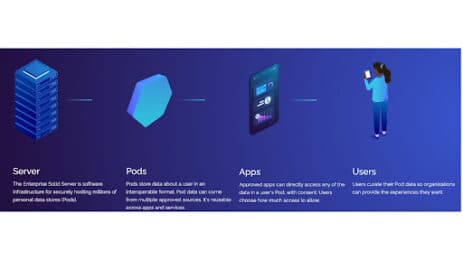We’ve seen Twitter’s Blue subscription’s premium verification and Meta’s Meta Verified on Instagram and Facebook. LinkedIn has joined the effort, offering free options to verify your identity and workplace. These companies provide user verification to boost platform confidence.
Why is this crucial?
Building trust in today’s digitally connected society requires establishing one’s identity. Trustworthy digital identities enable users to confidently interact with others, access services, and participate in the digital economy securely and efficiently.
Our data is distributed worldwide, and long-standing centralized systems have left us dependent on giant corporations that manage our data and identities. Self-sovereign identification, which lets users control their data, is in demand as people grow more conscious and cautious about their identity and data.
Digital identification systems exist today. What is wrong with them?
Companies struggle with KYC and due diligence. Traditional approaches lack security, privacy, and scalability, leaving the possibility for fraud and exploitation of personal data. Identity theft is on the rise, as evidenced by the Federal Trade Commission (FTC) estimating that there were 1.1 million cases of identity theft in 2022, with losses to frauds totaling $8.8 billion. Undoubtedly, there is a risk of reputational and financial harm to organizations.
Effective digital identification systems are consequently required for businesses to build trust and service access.

Why upgrade current digital identity solutions?
Individuals, corporations, and governments benefit from digital identity systems. Here are a few:
- Brandessence Market Research expects the digital identity solutions market to expand 16.24% annually to USD 70.82 million by 2028.
- Digital identity solutions can automate, streamline, and decrease human error. These systems offer identity as a service, letting organizations share consumer data with parties who don’t store it.
- Digital identity solutions help broker trust and collaboration between enterprises. New revenue streams and brand recognition can emerge.
- Financial institutions can leverage trusted user attributes from digital identification to create individualized risk profiles for their consumers and customize credit and risk-based products with their consent.
- Digital identification solutions enable secure and convenient access to public services and benefits, affecting government services and public trust. This can boost citizen satisfaction and government trust.
- Digital identity solutions offer levels of identification and verification for cybersecurity and fraud prevention. This lowers identity theft, account takeovers, and other cyberattacks.
A look at global initiatives centered on digital identity solutions:
Globally, there is a drive toward digital identification solutions, with numerous projects and technologies seeking to overcome the issues that physical identity systems confront.
Let’s look at some of them.
- The United Nations (UN) and World Bank’s ID4D initiative intends to guarantee legal identity to every individual on the planet by 2030. This ambitious goal attempts to solve challenges such as financial marginalization, social exclusion, and difficulty accessing essential services resulting from a lack of a competent identity system.
- The Decentralized Identity Foundation (DIF) and the World Wide Web Consortium (W3C) have been crucial players in establishing and improving decentralized identity system standards. The DIF is committed to creating an open-source, interoperable ecosystem for decentralized identity solutions, and the W3C has released the Decentralized Identifiers (DIDs) specification, which outlines the essential principles and guidelines for creating and managing DIDs.
- Smart borders and airports are also becoming more common. With over 1.2 billion ePassports in circulation and a strong push for biometrics, passengers may experience secure, quick, and frictionless cross-border travel. These technical breakthroughs allow for the free movement of people and products across borders while ensuring security and privacy.
- Governments worldwide increasingly adopt digital identity solutions to provide universal identification and enhance public services.
Here is a list of a few such initiatives:
- ID2020, a 2016 UN summit on digital identification, began deliberations.
- Belgium uses itsme mobile ID for secure and efficient citizen identification.
- Filipinos can get national IDs through PhilSys.
- Germany has a digital national ID card to simplify identification.
- Australia’s myGovID digital identity scheme is improving online security.
- The Pan-Canadian Trust Framework unifies digital identification across Canada.
- Aadhaar uses biometric and demographic data to identify over 1.3 billion Indians.
Let us now look at the many technological solutions that are emerging in the sphere of digital identification and privacy control.
Identity verification solutions
Identity verification solutions have evolved, incorporating diverse technologies and approaches to produce interconnected, secure, and user-friendly systems. These solutions include authentication and authorization systems, biometric authentication, and services for digital identity verification.
Identity verification solutions are built on authentication and authorization procedures. Popular alternatives include usernames and passwords, Single Sign-On (SSO), and Identity Federation protocols such as SAML 2.0, OAuth2, and OpenID Connect (OIDC). These technologies enable customers to access numerous services while keeping a secure connection.
Biometric authentication has evolved as a cutting-edge technology that works with traditional approaches. Technologies such as facial recognition, fingerprint recognition, handprint recognition, retina scans, and voice recognition offer added protection. Liveness detection capabilities are being implemented into these systems to combat potential spoofing, making biometric authentication even more safe and trustworthy.
Organizations that use these integrated identity verification technologies include Thales, TrustID, and Jumio. Thales’ ID Verification solution uses liveness detection for strong and secure biometric authentication. In contrast, TrustID offers digital identity verification services such as document verification and facial recognition technology to validate an individual’s identification accurately.
These solutions offer a comprehensive and integrated ecosystem by mixing diverse identity verification technologies, improving security, streamlining identity management operations, and improving user experience.
Solutions for data privacy and control
- Blockchain-based identity solutions
Blockchain-based self-sovereign identity (SSI) solutions have emerged as Web3 decentralization gains momentum. Modern identification solutions leverage blockchain networks to give consumers control over their data. This permits individuals to defend their privacy and security in our increasingly linked world without third-party intermediaries or centralized agencies.

Blockchain-based identity solutions offer several benefits:
- True sovereignty: Users may restrict who sees their data and share only the essential details.
- Core decentralization: Distributed ledger technology eliminates central authority control over identification data, reducing data breaches and misuse.
- Immutability: Blockchain’s encryption methods and consensus procedures make data on the ledger practically unchangeable. This improves data trust and identity verification.
- Transparency: Blockchain allows users and third parties to readily audit and verify data on the ledger, building trust.
Some notable blockchain-based identity solutions:
- Serto, Veramo, BrightID, Bloom, Identity, and SelfKey are Ethereum-based blockchain-based identity systems.
- Sovrin uses Hyperledger Indy, and TrustGrid uses Hyperledger Fabric.
Non-blockchain identity solutions:
Digital identity management isn’t limited to blockchain-based solutions. Non-blockchain alternatives that support Sir Tim Berners-vision Lee’s decentralized web that gives users more privacy and control over their data are also growing in popularity.

Inrupt Solid, Sir Tim Berners-web-based Lee’s identity management program, lets users establish and maintain their online data stores, or “pods,” for data privacy and control. These pods allow users to choose what data to share and with whom, making digital identity management more private.
Another new approach, digital identity wallets, allows users to control their data without blockchain technology. These wallets securely hold encrypted versions of vital papers, including driver’s licenses, healthcare credentials, passports, educational diplomas, and employment records, allowing users to exchange data selectively. Users can also share only the information needed, such as confirming age, without exposing the certificate. Thales’ New ID Wallet, DigiLocker, Yoti, and ID.me are some examples of digital identity wallets.
The Common Trust Network and Smart Health Cards framework provide a global, interoperable solution for securely sharing health data while protecting user privacy.
Conclusion
Creating a secure identity is becoming increasingly important as the digital world evolves rapidly. According to a recent study, online consumer identity identification has become a top concern for executives. We can expect a more empowered landscape in the future as numerous worldwide initiatives and technology solutions join forces to develop a more user-centric approach to identification and privacy control. Strong identification systems will encourage self-sovereign identity, allowing people to take control of their data confidently.





